Events and Development: Types, Impacts, and Sustainability
VerifiedAdded on 2021/04/16
|7
|1776
|37
Essay
AI Summary
This essay delves into the history of events, tracing their origins from the Ptolemaic dynasty to modern times, highlighting the evolution from royal entertainment to collaborative business ventures and political movements. It defines event tourism and its significance in international tourism, emphasizing its role in destination management and economic development. The essay categorizes various types of events, including cultural, political, business, scientific, and sports events, and discusses mega, hallmark, major, and community events, detailing their characteristics and impacts on tourism. It examines the influence of events on regional economies, social-cultural aspects, and environmental enhancements, including both positive and negative impacts. The conclusion emphasizes the importance of sustainable event arrangements, considering economic, social, and environmental factors for the benefit of the host region and the participants.
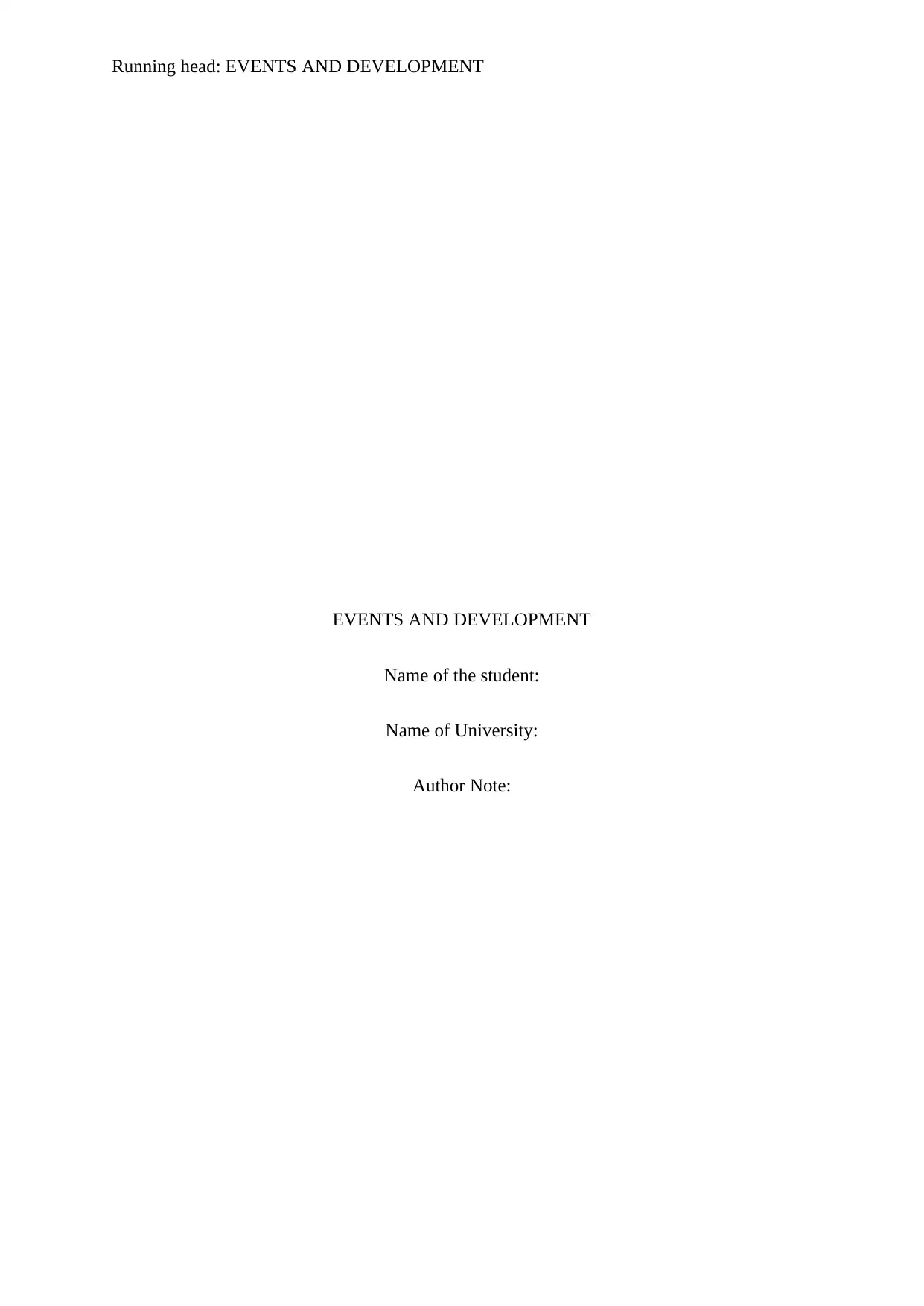
Running head: EVENTS AND DEVELOPMENT
EVENTS AND DEVELOPMENT
Name of the student:
Name of University:
Author Note:
EVENTS AND DEVELOPMENT
Name of the student:
Name of University:
Author Note:
Paraphrase This Document
Need a fresh take? Get an instant paraphrase of this document with our AI Paraphraser
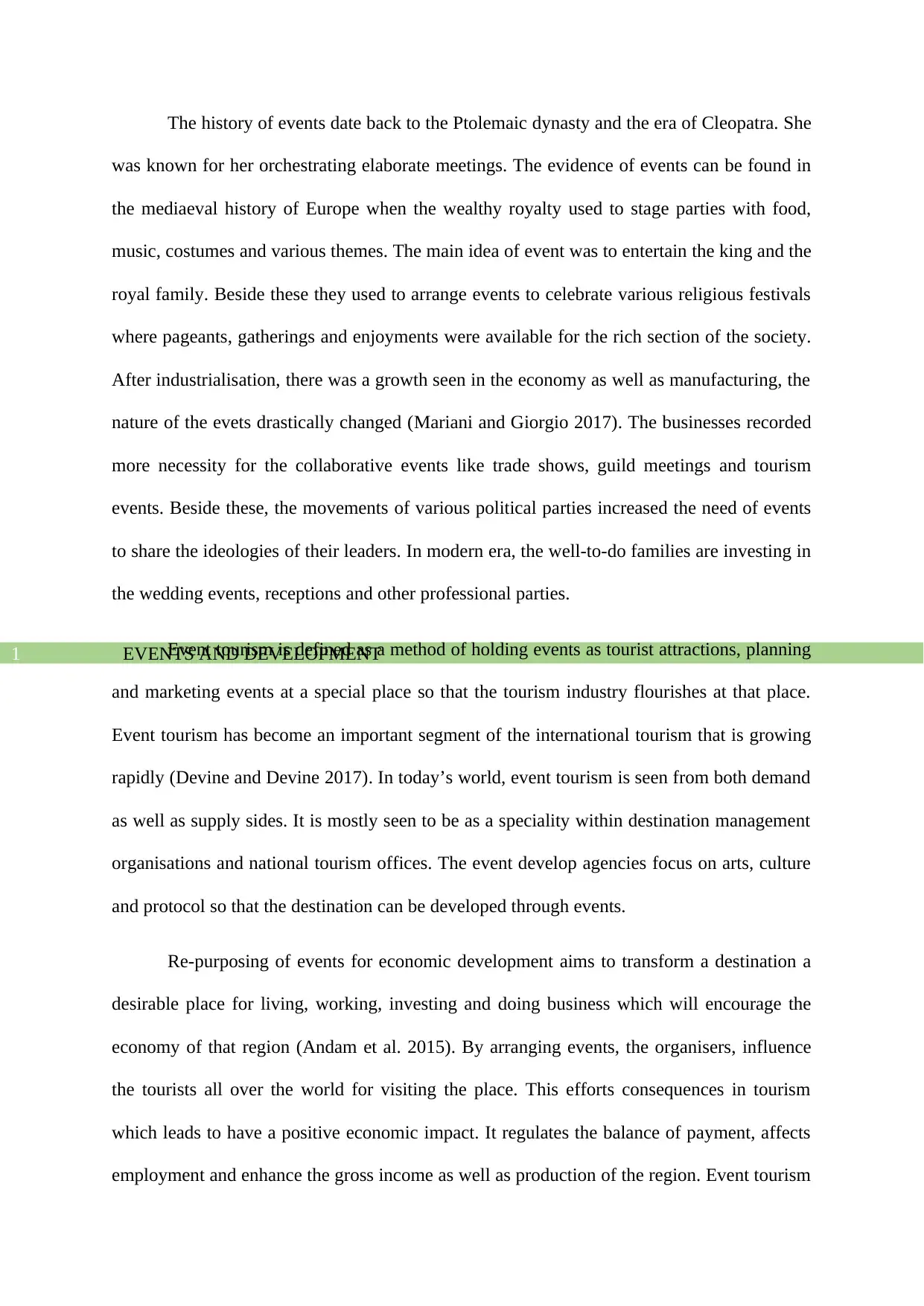
EVENTS AND DEVELOPMENT1
The history of events date back to the Ptolemaic dynasty and the era of Cleopatra. She
was known for her orchestrating elaborate meetings. The evidence of events can be found in
the mediaeval history of Europe when the wealthy royalty used to stage parties with food,
music, costumes and various themes. The main idea of event was to entertain the king and the
royal family. Beside these they used to arrange events to celebrate various religious festivals
where pageants, gatherings and enjoyments were available for the rich section of the society.
After industrialisation, there was a growth seen in the economy as well as manufacturing, the
nature of the evets drastically changed (Mariani and Giorgio 2017). The businesses recorded
more necessity for the collaborative events like trade shows, guild meetings and tourism
events. Beside these, the movements of various political parties increased the need of events
to share the ideologies of their leaders. In modern era, the well-to-do families are investing in
the wedding events, receptions and other professional parties.
Event tourism is defined as a method of holding events as tourist attractions, planning
and marketing events at a special place so that the tourism industry flourishes at that place.
Event tourism has become an important segment of the international tourism that is growing
rapidly (Devine and Devine 2017). In today’s world, event tourism is seen from both demand
as well as supply sides. It is mostly seen to be as a speciality within destination management
organisations and national tourism offices. The event develop agencies focus on arts, culture
and protocol so that the destination can be developed through events.
Re-purposing of events for economic development aims to transform a destination a
desirable place for living, working, investing and doing business which will encourage the
economy of that region (Andam et al. 2015). By arranging events, the organisers, influence
the tourists all over the world for visiting the place. This efforts consequences in tourism
which leads to have a positive economic impact. It regulates the balance of payment, affects
employment and enhance the gross income as well as production of the region. Event tourism
The history of events date back to the Ptolemaic dynasty and the era of Cleopatra. She
was known for her orchestrating elaborate meetings. The evidence of events can be found in
the mediaeval history of Europe when the wealthy royalty used to stage parties with food,
music, costumes and various themes. The main idea of event was to entertain the king and the
royal family. Beside these they used to arrange events to celebrate various religious festivals
where pageants, gatherings and enjoyments were available for the rich section of the society.
After industrialisation, there was a growth seen in the economy as well as manufacturing, the
nature of the evets drastically changed (Mariani and Giorgio 2017). The businesses recorded
more necessity for the collaborative events like trade shows, guild meetings and tourism
events. Beside these, the movements of various political parties increased the need of events
to share the ideologies of their leaders. In modern era, the well-to-do families are investing in
the wedding events, receptions and other professional parties.
Event tourism is defined as a method of holding events as tourist attractions, planning
and marketing events at a special place so that the tourism industry flourishes at that place.
Event tourism has become an important segment of the international tourism that is growing
rapidly (Devine and Devine 2017). In today’s world, event tourism is seen from both demand
as well as supply sides. It is mostly seen to be as a speciality within destination management
organisations and national tourism offices. The event develop agencies focus on arts, culture
and protocol so that the destination can be developed through events.
Re-purposing of events for economic development aims to transform a destination a
desirable place for living, working, investing and doing business which will encourage the
economy of that region (Andam et al. 2015). By arranging events, the organisers, influence
the tourists all over the world for visiting the place. This efforts consequences in tourism
which leads to have a positive economic impact. It regulates the balance of payment, affects
employment and enhance the gross income as well as production of the region. Event tourism
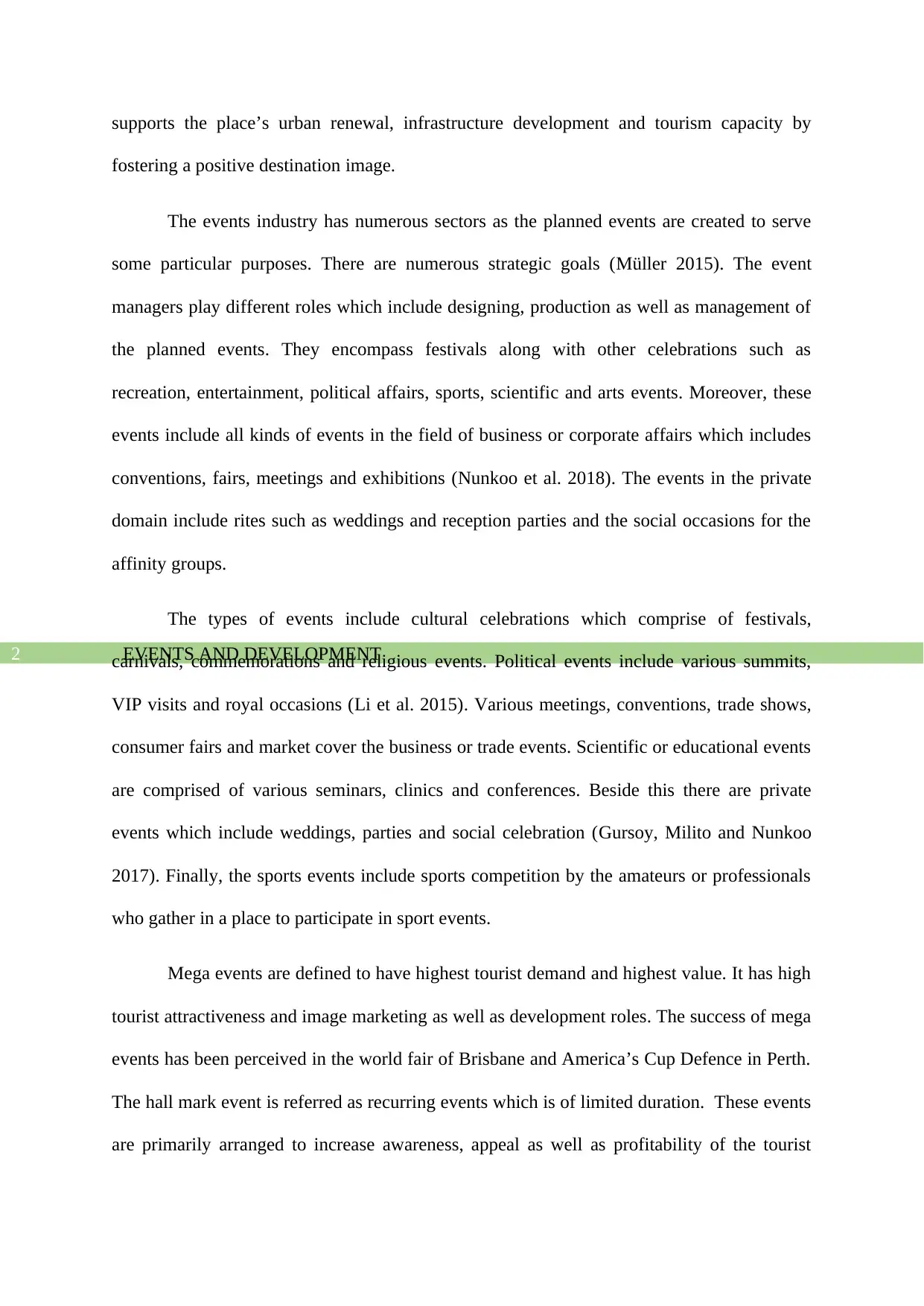
EVENTS AND DEVELOPMENT2
supports the place’s urban renewal, infrastructure development and tourism capacity by
fostering a positive destination image.
The events industry has numerous sectors as the planned events are created to serve
some particular purposes. There are numerous strategic goals (Müller 2015). The event
managers play different roles which include designing, production as well as management of
the planned events. They encompass festivals along with other celebrations such as
recreation, entertainment, political affairs, sports, scientific and arts events. Moreover, these
events include all kinds of events in the field of business or corporate affairs which includes
conventions, fairs, meetings and exhibitions (Nunkoo et al. 2018). The events in the private
domain include rites such as weddings and reception parties and the social occasions for the
affinity groups.
The types of events include cultural celebrations which comprise of festivals,
carnivals, commemorations and religious events. Political events include various summits,
VIP visits and royal occasions (Li et al. 2015). Various meetings, conventions, trade shows,
consumer fairs and market cover the business or trade events. Scientific or educational events
are comprised of various seminars, clinics and conferences. Beside this there are private
events which include weddings, parties and social celebration (Gursoy, Milito and Nunkoo
2017). Finally, the sports events include sports competition by the amateurs or professionals
who gather in a place to participate in sport events.
Mega events are defined to have highest tourist demand and highest value. It has high
tourist attractiveness and image marketing as well as development roles. The success of mega
events has been perceived in the world fair of Brisbane and America’s Cup Defence in Perth.
The hall mark event is referred as recurring events which is of limited duration. These events
are primarily arranged to increase awareness, appeal as well as profitability of the tourist
supports the place’s urban renewal, infrastructure development and tourism capacity by
fostering a positive destination image.
The events industry has numerous sectors as the planned events are created to serve
some particular purposes. There are numerous strategic goals (Müller 2015). The event
managers play different roles which include designing, production as well as management of
the planned events. They encompass festivals along with other celebrations such as
recreation, entertainment, political affairs, sports, scientific and arts events. Moreover, these
events include all kinds of events in the field of business or corporate affairs which includes
conventions, fairs, meetings and exhibitions (Nunkoo et al. 2018). The events in the private
domain include rites such as weddings and reception parties and the social occasions for the
affinity groups.
The types of events include cultural celebrations which comprise of festivals,
carnivals, commemorations and religious events. Political events include various summits,
VIP visits and royal occasions (Li et al. 2015). Various meetings, conventions, trade shows,
consumer fairs and market cover the business or trade events. Scientific or educational events
are comprised of various seminars, clinics and conferences. Beside this there are private
events which include weddings, parties and social celebration (Gursoy, Milito and Nunkoo
2017). Finally, the sports events include sports competition by the amateurs or professionals
who gather in a place to participate in sport events.
Mega events are defined to have highest tourist demand and highest value. It has high
tourist attractiveness and image marketing as well as development roles. The success of mega
events has been perceived in the world fair of Brisbane and America’s Cup Defence in Perth.
The hall mark event is referred as recurring events which is of limited duration. These events
are primarily arranged to increase awareness, appeal as well as profitability of the tourist
⊘ This is a preview!⊘
Do you want full access?
Subscribe today to unlock all pages.

Trusted by 1+ million students worldwide
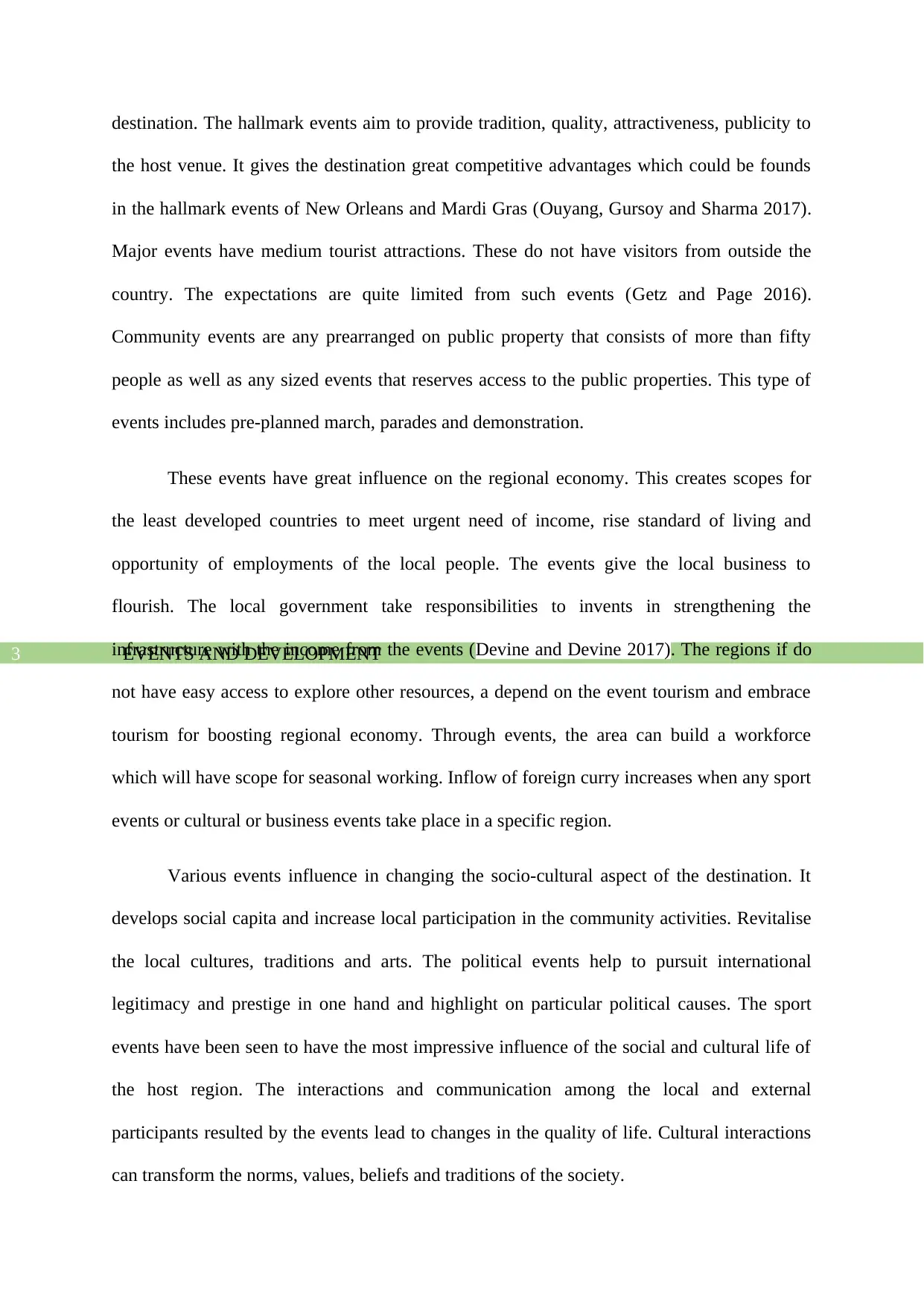
EVENTS AND DEVELOPMENT3
destination. The hallmark events aim to provide tradition, quality, attractiveness, publicity to
the host venue. It gives the destination great competitive advantages which could be founds
in the hallmark events of New Orleans and Mardi Gras (Ouyang, Gursoy and Sharma 2017).
Major events have medium tourist attractions. These do not have visitors from outside the
country. The expectations are quite limited from such events (Getz and Page 2016).
Community events are any prearranged on public property that consists of more than fifty
people as well as any sized events that reserves access to the public properties. This type of
events includes pre-planned march, parades and demonstration.
These events have great influence on the regional economy. This creates scopes for
the least developed countries to meet urgent need of income, rise standard of living and
opportunity of employments of the local people. The events give the local business to
flourish. The local government take responsibilities to invents in strengthening the
infrastructure with the income from the events (Devine and Devine 2017). The regions if do
not have easy access to explore other resources, a depend on the event tourism and embrace
tourism for boosting regional economy. Through events, the area can build a workforce
which will have scope for seasonal working. Inflow of foreign curry increases when any sport
events or cultural or business events take place in a specific region.
Various events influence in changing the socio-cultural aspect of the destination. It
develops social capita and increase local participation in the community activities. Revitalise
the local cultures, traditions and arts. The political events help to pursuit international
legitimacy and prestige in one hand and highlight on particular political causes. The sport
events have been seen to have the most impressive influence of the social and cultural life of
the host region. The interactions and communication among the local and external
participants resulted by the events lead to changes in the quality of life. Cultural interactions
can transform the norms, values, beliefs and traditions of the society.
destination. The hallmark events aim to provide tradition, quality, attractiveness, publicity to
the host venue. It gives the destination great competitive advantages which could be founds
in the hallmark events of New Orleans and Mardi Gras (Ouyang, Gursoy and Sharma 2017).
Major events have medium tourist attractions. These do not have visitors from outside the
country. The expectations are quite limited from such events (Getz and Page 2016).
Community events are any prearranged on public property that consists of more than fifty
people as well as any sized events that reserves access to the public properties. This type of
events includes pre-planned march, parades and demonstration.
These events have great influence on the regional economy. This creates scopes for
the least developed countries to meet urgent need of income, rise standard of living and
opportunity of employments of the local people. The events give the local business to
flourish. The local government take responsibilities to invents in strengthening the
infrastructure with the income from the events (Devine and Devine 2017). The regions if do
not have easy access to explore other resources, a depend on the event tourism and embrace
tourism for boosting regional economy. Through events, the area can build a workforce
which will have scope for seasonal working. Inflow of foreign curry increases when any sport
events or cultural or business events take place in a specific region.
Various events influence in changing the socio-cultural aspect of the destination. It
develops social capita and increase local participation in the community activities. Revitalise
the local cultures, traditions and arts. The political events help to pursuit international
legitimacy and prestige in one hand and highlight on particular political causes. The sport
events have been seen to have the most impressive influence of the social and cultural life of
the host region. The interactions and communication among the local and external
participants resulted by the events lead to changes in the quality of life. Cultural interactions
can transform the norms, values, beliefs and traditions of the society.
Paraphrase This Document
Need a fresh take? Get an instant paraphrase of this document with our AI Paraphraser
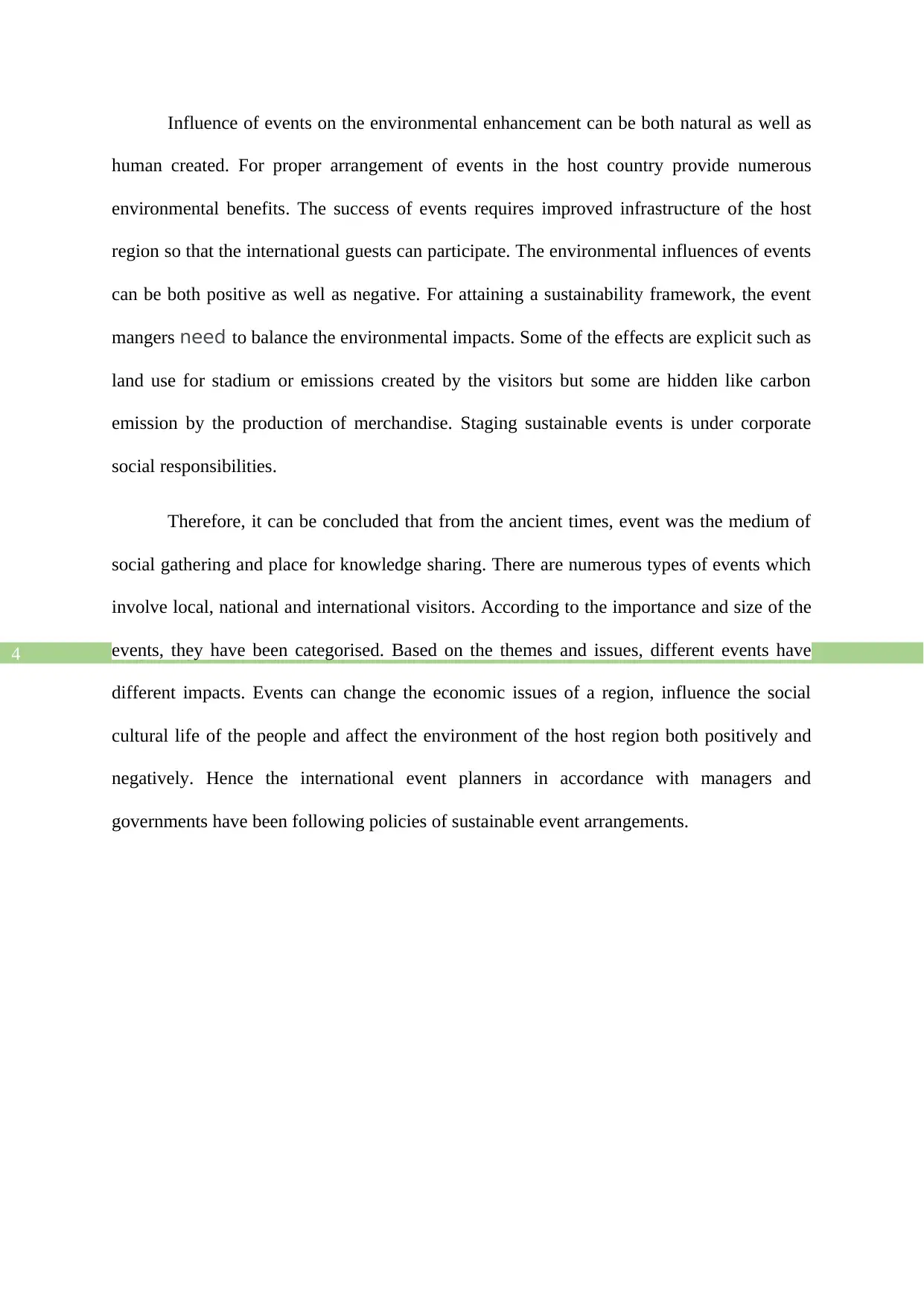
EVENTS AND DEVELOPMENT4
Influence of events on the environmental enhancement can be both natural as well as
human created. For proper arrangement of events in the host country provide numerous
environmental benefits. The success of events requires improved infrastructure of the host
region so that the international guests can participate. The environmental influences of events
can be both positive as well as negative. For attaining a sustainability framework, the event
mangers need to balance the environmental impacts. Some of the effects are explicit such as
land use for stadium or emissions created by the visitors but some are hidden like carbon
emission by the production of merchandise. Staging sustainable events is under corporate
social responsibilities.
Therefore, it can be concluded that from the ancient times, event was the medium of
social gathering and place for knowledge sharing. There are numerous types of events which
involve local, national and international visitors. According to the importance and size of the
events, they have been categorised. Based on the themes and issues, different events have
different impacts. Events can change the economic issues of a region, influence the social
cultural life of the people and affect the environment of the host region both positively and
negatively. Hence the international event planners in accordance with managers and
governments have been following policies of sustainable event arrangements.
Influence of events on the environmental enhancement can be both natural as well as
human created. For proper arrangement of events in the host country provide numerous
environmental benefits. The success of events requires improved infrastructure of the host
region so that the international guests can participate. The environmental influences of events
can be both positive as well as negative. For attaining a sustainability framework, the event
mangers need to balance the environmental impacts. Some of the effects are explicit such as
land use for stadium or emissions created by the visitors but some are hidden like carbon
emission by the production of merchandise. Staging sustainable events is under corporate
social responsibilities.
Therefore, it can be concluded that from the ancient times, event was the medium of
social gathering and place for knowledge sharing. There are numerous types of events which
involve local, national and international visitors. According to the importance and size of the
events, they have been categorised. Based on the themes and issues, different events have
different impacts. Events can change the economic issues of a region, influence the social
cultural life of the people and affect the environment of the host region both positively and
negatively. Hence the international event planners in accordance with managers and
governments have been following policies of sustainable event arrangements.
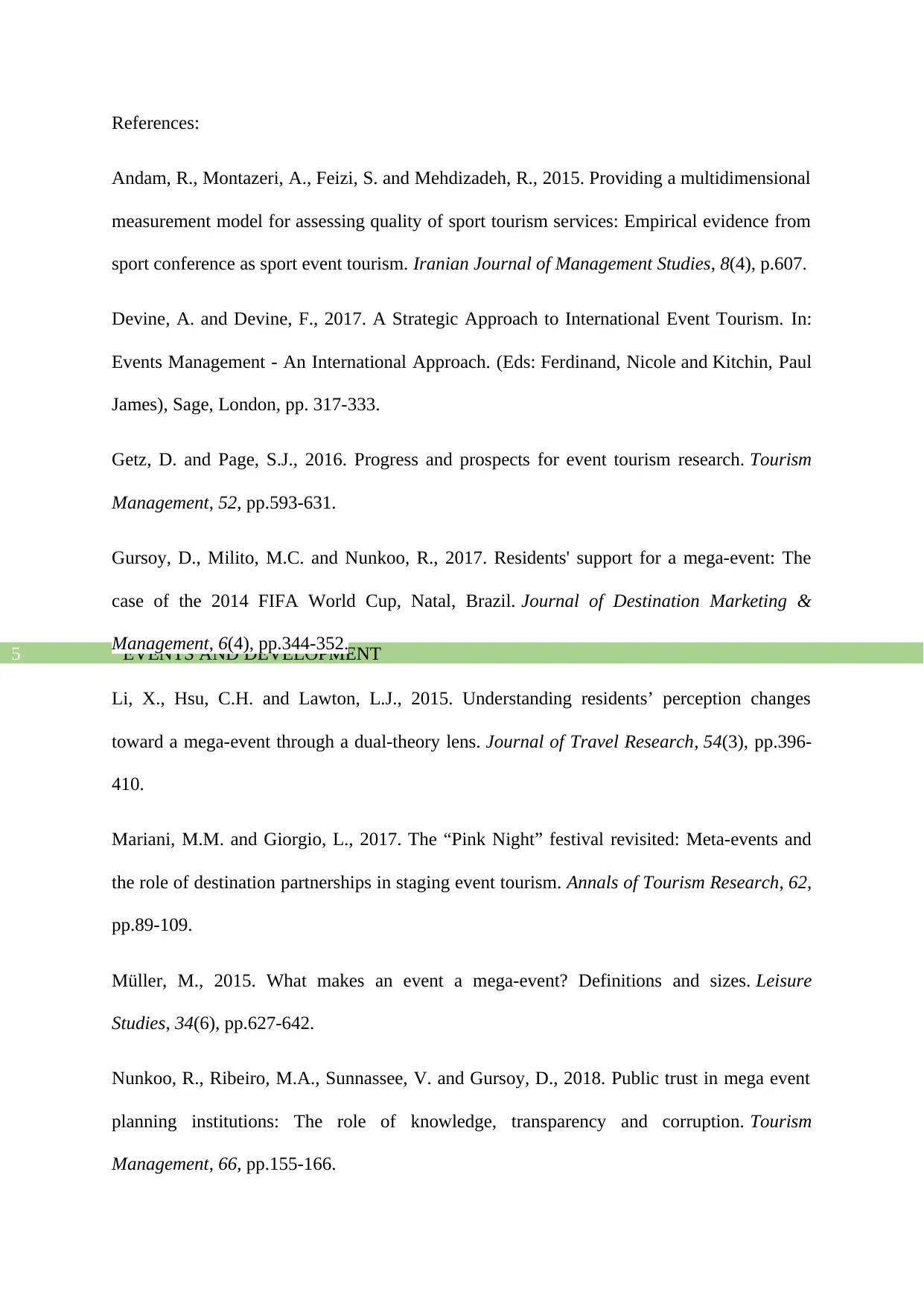
EVENTS AND DEVELOPMENT5
References:
Andam, R., Montazeri, A., Feizi, S. and Mehdizadeh, R., 2015. Providing a multidimensional
measurement model for assessing quality of sport tourism services: Empirical evidence from
sport conference as sport event tourism. Iranian Journal of Management Studies, 8(4), p.607.
Devine, A. and Devine, F., 2017. A Strategic Approach to International Event Tourism. In:
Events Management - An International Approach. (Eds: Ferdinand, Nicole and Kitchin, Paul
James), Sage, London, pp. 317-333.
Getz, D. and Page, S.J., 2016. Progress and prospects for event tourism research. Tourism
Management, 52, pp.593-631.
Gursoy, D., Milito, M.C. and Nunkoo, R., 2017. Residents' support for a mega-event: The
case of the 2014 FIFA World Cup, Natal, Brazil. Journal of Destination Marketing &
Management, 6(4), pp.344-352.
Li, X., Hsu, C.H. and Lawton, L.J., 2015. Understanding residents’ perception changes
toward a mega-event through a dual-theory lens. Journal of Travel Research, 54(3), pp.396-
410.
Mariani, M.M. and Giorgio, L., 2017. The “Pink Night” festival revisited: Meta-events and
the role of destination partnerships in staging event tourism. Annals of Tourism Research, 62,
pp.89-109.
Müller, M., 2015. What makes an event a mega-event? Definitions and sizes. Leisure
Studies, 34(6), pp.627-642.
Nunkoo, R., Ribeiro, M.A., Sunnassee, V. and Gursoy, D., 2018. Public trust in mega event
planning institutions: The role of knowledge, transparency and corruption. Tourism
Management, 66, pp.155-166.
References:
Andam, R., Montazeri, A., Feizi, S. and Mehdizadeh, R., 2015. Providing a multidimensional
measurement model for assessing quality of sport tourism services: Empirical evidence from
sport conference as sport event tourism. Iranian Journal of Management Studies, 8(4), p.607.
Devine, A. and Devine, F., 2017. A Strategic Approach to International Event Tourism. In:
Events Management - An International Approach. (Eds: Ferdinand, Nicole and Kitchin, Paul
James), Sage, London, pp. 317-333.
Getz, D. and Page, S.J., 2016. Progress and prospects for event tourism research. Tourism
Management, 52, pp.593-631.
Gursoy, D., Milito, M.C. and Nunkoo, R., 2017. Residents' support for a mega-event: The
case of the 2014 FIFA World Cup, Natal, Brazil. Journal of Destination Marketing &
Management, 6(4), pp.344-352.
Li, X., Hsu, C.H. and Lawton, L.J., 2015. Understanding residents’ perception changes
toward a mega-event through a dual-theory lens. Journal of Travel Research, 54(3), pp.396-
410.
Mariani, M.M. and Giorgio, L., 2017. The “Pink Night” festival revisited: Meta-events and
the role of destination partnerships in staging event tourism. Annals of Tourism Research, 62,
pp.89-109.
Müller, M., 2015. What makes an event a mega-event? Definitions and sizes. Leisure
Studies, 34(6), pp.627-642.
Nunkoo, R., Ribeiro, M.A., Sunnassee, V. and Gursoy, D., 2018. Public trust in mega event
planning institutions: The role of knowledge, transparency and corruption. Tourism
Management, 66, pp.155-166.
⊘ This is a preview!⊘
Do you want full access?
Subscribe today to unlock all pages.

Trusted by 1+ million students worldwide
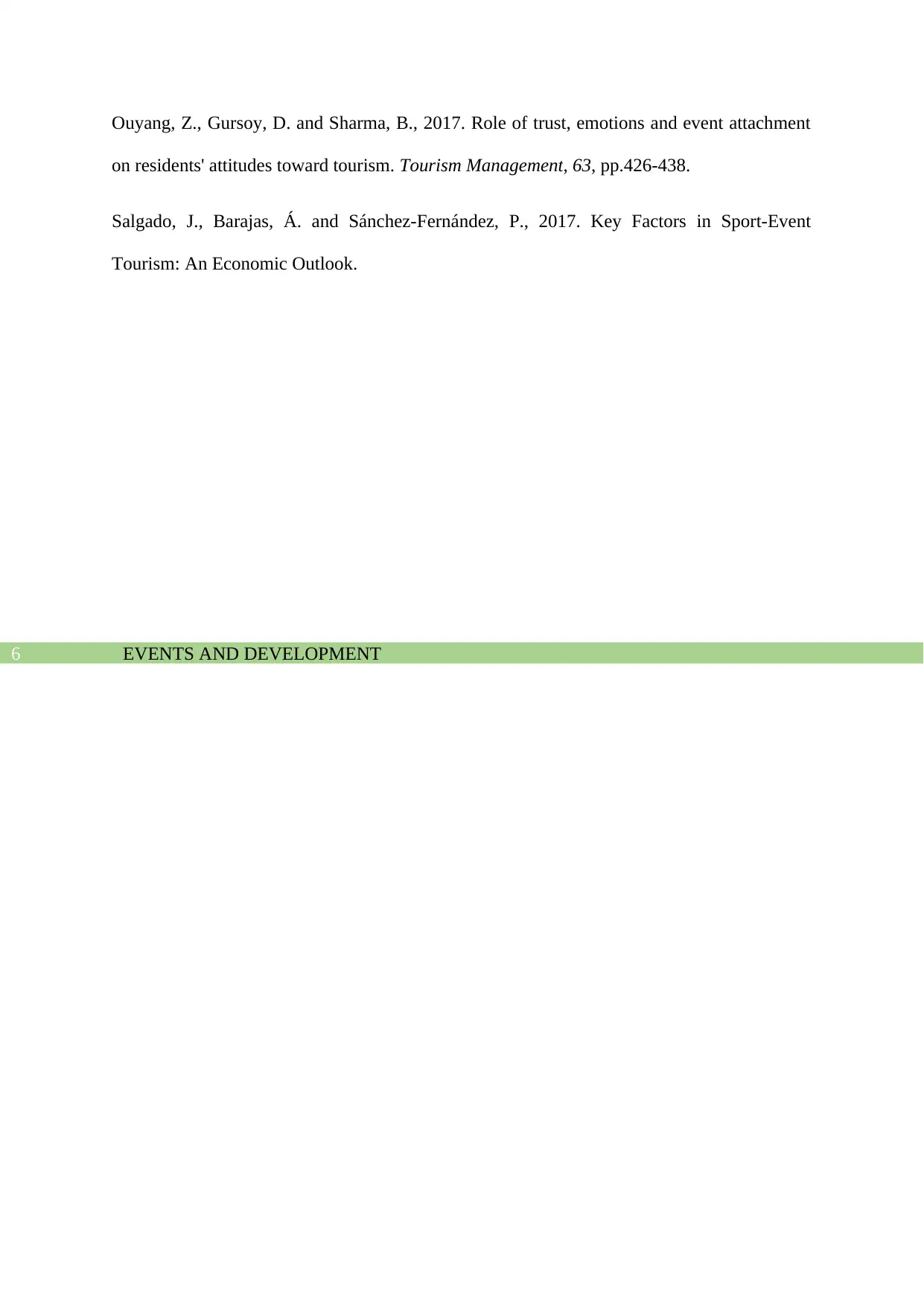
EVENTS AND DEVELOPMENT6
Ouyang, Z., Gursoy, D. and Sharma, B., 2017. Role of trust, emotions and event attachment
on residents' attitudes toward tourism. Tourism Management, 63, pp.426-438.
Salgado, J., Barajas, Á. and Sánchez-Fernández, P., 2017. Key Factors in Sport-Event
Tourism: An Economic Outlook.
Ouyang, Z., Gursoy, D. and Sharma, B., 2017. Role of trust, emotions and event attachment
on residents' attitudes toward tourism. Tourism Management, 63, pp.426-438.
Salgado, J., Barajas, Á. and Sánchez-Fernández, P., 2017. Key Factors in Sport-Event
Tourism: An Economic Outlook.
1 out of 7
Related Documents
Your All-in-One AI-Powered Toolkit for Academic Success.
+13062052269
info@desklib.com
Available 24*7 on WhatsApp / Email
![[object Object]](/_next/static/media/star-bottom.7253800d.svg)
Unlock your academic potential
Copyright © 2020–2026 A2Z Services. All Rights Reserved. Developed and managed by ZUCOL.





